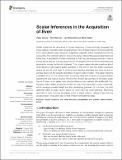| dc.contributor.author | Gowda, Yadav | |
| dc.contributor.author | Newman, Elise | |
| dc.contributor.author | Rosenstein, Leo | |
| dc.contributor.author | Hackl, Martin | |
| dc.date.accessioned | 2021-09-29T14:52:31Z | |
| dc.date.available | 2021-09-29T14:52:31Z | |
| dc.date.issued | 2020-12 | |
| dc.date.submitted | 2020-08 | |
| dc.identifier.issn | 2297-900X | |
| dc.identifier.uri | https://hdl.handle.net/1721.1/132658 | |
| dc.description.abstract | Scalar inferences are ubiquitous in human reasoning. Correspondingly, language has many means of expressing and encoding them. One of these means is the focus particle even, which utilizes scalar inferences to signal the pragmatic status of asserted content as noteworthy. The vehicles that even employs to signal noteworthiness are scalar likelihood inferences. A peculiarity of these inferences is that they are presuppositional in nature (not-at-issue) and yet, they are responsive to the polarity of the sentence expressing the proposition whose likelihood is signaled. This property raises intricate questions about what learners might expect scalar operators of this sort to look like (initial hypothesis space) as well as what type of evidence and learning strategies they have access to as they figure out the specific properties of even in adult English. This paper presents a detailed study of this development, combining data from a series of comprehension experiments and corpus studies. We find that children are sensitive to the basic scalar nature of even much earlier than previous literature has claimed. We additionally find, however, that children sometimes exhibit non-adult-like responses to even sentences, which we argue provide insight into their developing grammar. On this view, the child grammar offers a larger option space for even than the adult grammar. Becoming adult-like, in turn, involves eliminating some of these options, namely those that are underutilized in production due to their limited conversational value. | en_US |
| dc.publisher | Frontiers Media SA | en_US |
| dc.relation.isversionof | https://doi.org/10.3389/fcomm.2020.593634 | en_US |
| dc.rights | Creative Commons Attribution 4.0 International license | en_US |
| dc.rights.uri | https://creativecommons.org/licenses/by/4.0/ | en_US |
| dc.source | Frontiers | en_US |
| dc.title | Scalar Inferences in the Acquisition of Even | en_US |
| dc.type | Article | en_US |
| dc.identifier.citation | Gowda, Yadav et al. "Scalar Inferences in the Acquisition of Even." Frontiers in Communication (December 2020): 593634. © 2020 Gowda et al. | en_US |
| dc.contributor.department | Massachusetts Institute of Technology. Department of Linguistics and Philosophy | en_US |
| dc.relation.journal | Frontiers in Communication | en_US |
| dc.eprint.version | Final published version | en_US |
| dc.type.uri | http://purl.org/eprint/type/JournalArticle | en_US |
| eprint.status | http://purl.org/eprint/status/PeerReviewed | en_US |
| dspace.date.submission | 2021-05-17T16:03:18Z | |
| mit.journal.volume | 5 | en_US |
| mit.license | PUBLISHER_CC | |
| mit.metadata.status | Complete | en_US |
